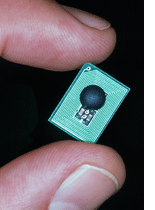Cubic expands its Tri-Reader technology to support the Jewel limited use smart card
22 March, 2006
category: Contactless, NFC, Transit
Cubic has announced its support of the limited use contactless smart card based on the Innovision-manufactured Jewel chip. Cubic, in its goal to achieve support for open architectures and offer its customers more choices, says the Jewel support is one more addition to the company’s library of card types already qualified for use with its Tri-Reader.
Successful Integration and Targeted Functionality Make Contactless Technology Available at an Attractive Cost
SAN DIEGO–The transportation segment of Cubic Corporation announced its Tri-Reader 2, the multi-protocol card interface device used in its newest automated fare collection equipment, now supports the latest low-cost Limited Use proximity smart card (Jewel), developed by Innovision Research and Technology LTD in the U.K.
Cubic, in its goal to achieve support for open architectures and customer choice, welcomes Jewel as another extension to Cubic’s extensive library of card types already qualified for use with the Tri-Reader. These card types include the MIFARE Classic, MIFARE UltraLight, MIFARE DESFire, the Cubic GO Card(R) and now the Innovision Jewel card. The Tri-Reader processes all cards meeting ISO 14443 standards. Cubic’s policy is to thoroughly test and qualify all cards before accepting them for use in order to ensure quality performance for our customers.
Once a new smart card format is added to the list of cards supported by the Tri-Reader 2, Cubic takes measures to ensure that it will function effectively in a public transit environment. Cubic’s transit customers benefit from these extra steps taken with the goal of achieving trouble free system operations.
“We are pleased to include the Innovision Jewel device in our list of approved smart media for the more than 50,000 Tri-Reader products that are currently deployed. Limited Use smart cards will be a valuable component in achieving the full spectrum of smart card operations in today’s automatic fare collection systems,” said Walt Bonneau, corporate vice president of Transit Technology for Cubic Corporation.
The low cost Jewel card fills the need for a convenient low cost ticket type suitable for passengers for whom regular contactless smart cards might not be convenient or cost effective.
“Because of the targeted functionality and low cost of the Jewel card, our transit agency customers will have the option of expanding contactless/proximity ticketing capability for a variety of uses, including day passes and other ticket products used in large numbers for the occasional riders, tourists, specific ticketing events, patrons that prefer a non-permanent card media and patrons that require a temporary ticket to substitute for a full-featured smart card that was lost or forgotten,” Bonneau said.
Many transit operators in urban areas are switching to or are considering switching to contactless smart card ticketing systems from traditional magnetic ticketing, because they encourage the use of public transportation by allowing commuters to travel quickly, seamlessly, switching between different operators’ bus and rail systems. Contactless technology is the cornerstone of “regionalizing” public transit across a wider metropolitan area.
“With the introduction of custom RFID chips specifically designed for low cost ticketing such as Innovision R&T’s Jewel product, manufacturers of tickets and contactless reader technology need to start taking advantage of these developments by designing interoperable systems,” said Innovision R&T’s Trevor Crotch-Harvey. “The message is loud and clear. Many of the barriers to adoption are being removed and, while there are many contactless ticketing trials now in place, it is up to the transport operators, authorities, systems integrators and vendors to seriously reevaluate this opportunity and make low cost smart ticketing for mass transit a reality.”
Contactless ticketing systems can also reduce overall system maintenance costs associated with electrical mechanisms used to read magnetic cards, offering an additional incentive for transit operators to switch from magnetic stripe ticketing to smart cards.
Innovision demonstrated this technology application at the American Public Transportation (APTA) Fare Collection Workshop in Atlanta.
Cubic Transportation Systems is the world’s largest provider of integrated electronic ticketing systems and has smart card contracts for public transit systems in North America, Europe and Asia. Every year, nearly 10 billion people use Cubic systems in more than 40 major markets in cities on five continents, including London, Washington, D.C., Hong Kong, Chicago, New York, Guangzhou, Shanghai, Atlanta, San Francisco, Singapore and Miami.
The corporation’s other major segment, Cubic Defense Applications, provides instrumented air and ground combat training systems, battle command training, simulations and simulation support for U.S. and allied military forces. The group also produces high technology avionics, data links and communications products for government and commercial customers, and a wide range of technical and logistics services. For more information about Cubic, see the company’ web site at www.cubic.com.
Innovision Research & Technology plc is one of Europe’s leading Radio Frequency Identification (RFID) IC Design and solutions providers. Focusing on RFID and ultra low-cost Integrated Circuit (IC) and electronic design, the company develops innovative technologies and technology applications for commercialisation and then licenses the technology on to its customers, who incorporate it into their own products. Innovision R&T is also at the heart of the emerging Near Field Communication (NFC) market, designing and developing solutions for the mobile handset and consumer device sectors.
The company’s work with customers includes pre-engineering studies, building of prototypes and complete product development through to production, including full custom silicon chip design.
Innovision R&T products include Jewel(R), the world’s smallest and lowest cost ITSO approved smart ticketing chip; and Io(R), one of the world’s smallest standards compatible near field RFID readers. Headquartered in the U.K., the company was established in 1994 and is listed on the Alternative Investment Market (AIM) of the London Stock Exchange (ticker symbol:INN). For further information, visit: www.innovision-group.com.
Explore more developments dealing with the implementation of Near Field Communications, a short-range wireless technology that promises to revolutionize contactless identification, payment, access, and more. Click to visit NFCNews.



